The MRes Students Take Barcelona
Today is my first day back in England after the Barcelona trip this week! It was a really interesting and fun trip - saw some beautiful architecture, ate some delicious food, and visited a ton of interesting museums!
Notable events of the trip:
- Visited the MACBA (Museum of Contemporary Art of Barcelona) and spent a whole lot of time at the Songs for Many Movements exhibition, which was mostly dedicated to displaying works by political art collectives. I was most interested in the displays of different zines and in the selection of animated films that were playing (the Intergenerational Micro-Cinema). The animated films were all aimed at children but all dealt with serious political issues - as the museum description put it: "There are those who believe there are issues that are inappropriate for children, things that should not be touched on, things that, nevertheless, are experienced daily by children the world over" - I particularly want to look more at "Nekem az elet teccik nagyon", a 1977 short film by Katy Macskassy that was made by a group of Hungarian Romani children as part of an animation workshop. The film recounts their experiences and feelings - I wonder about those kids. Did getting to make this animation based on hard things they'd been through help to process them? I like to think so at least - I'm a big supporter of giving kids a creative outlet, as we know. But how much can it truly help? Anyway it's hard to find any info about this film online but I found at least one clip on youtube - it's definitely the kind of project I'm interested in!





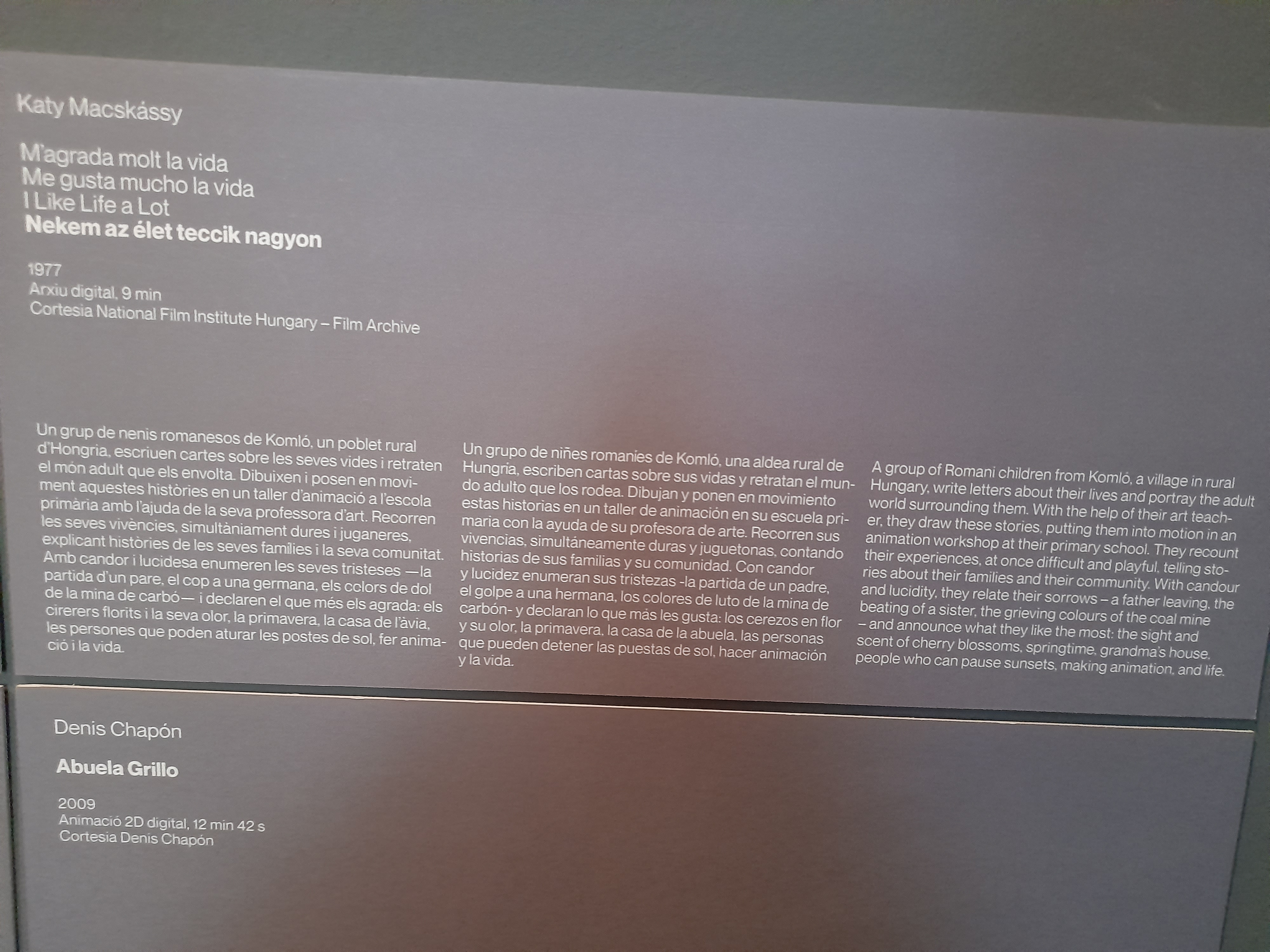
- Visited the Picasso Museum and saw some frankly incredible paintings of birds and dogs - they had a whole room dedicated to Picasso's versions of Las Meninas which was really cool to see!



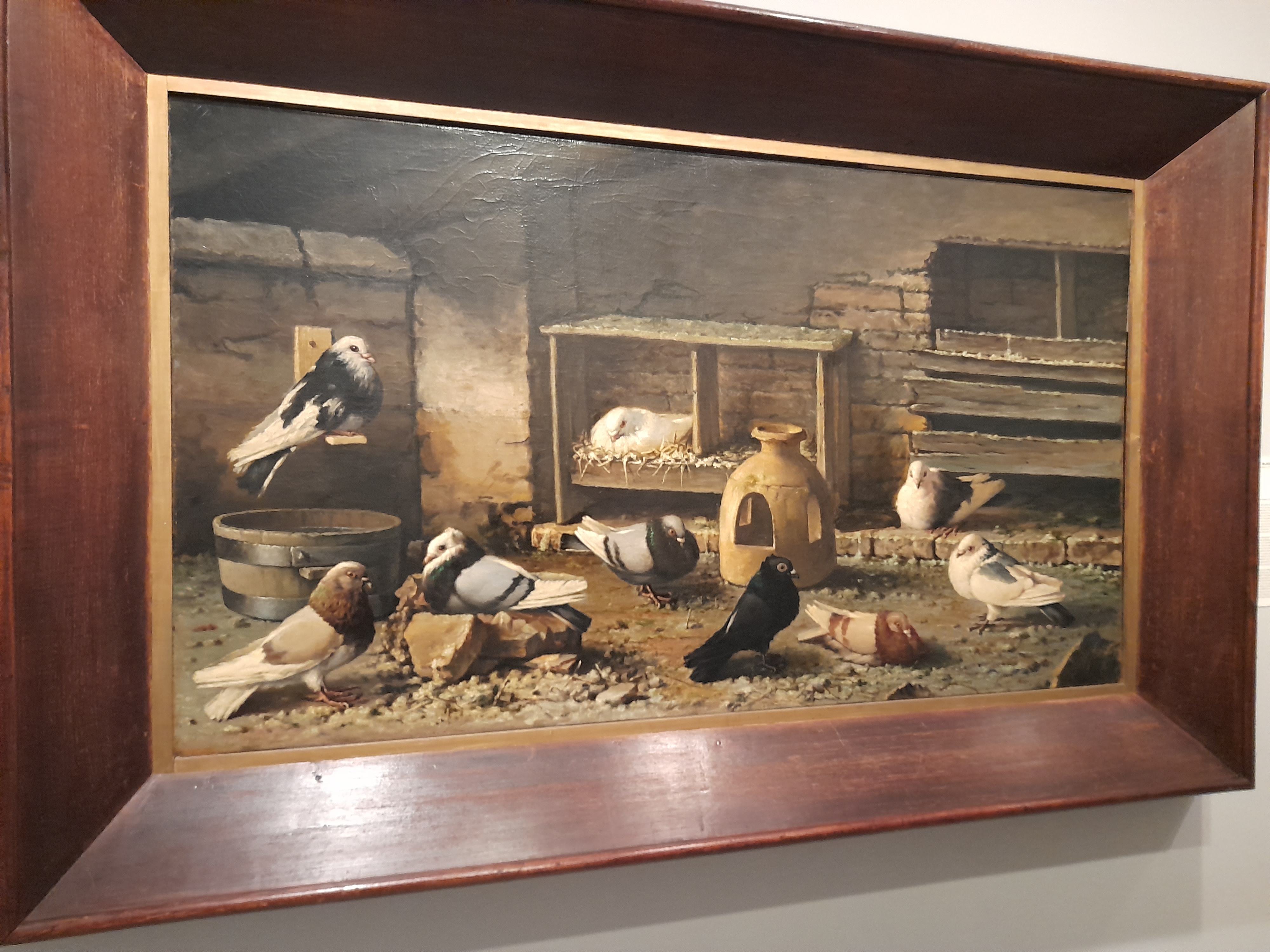
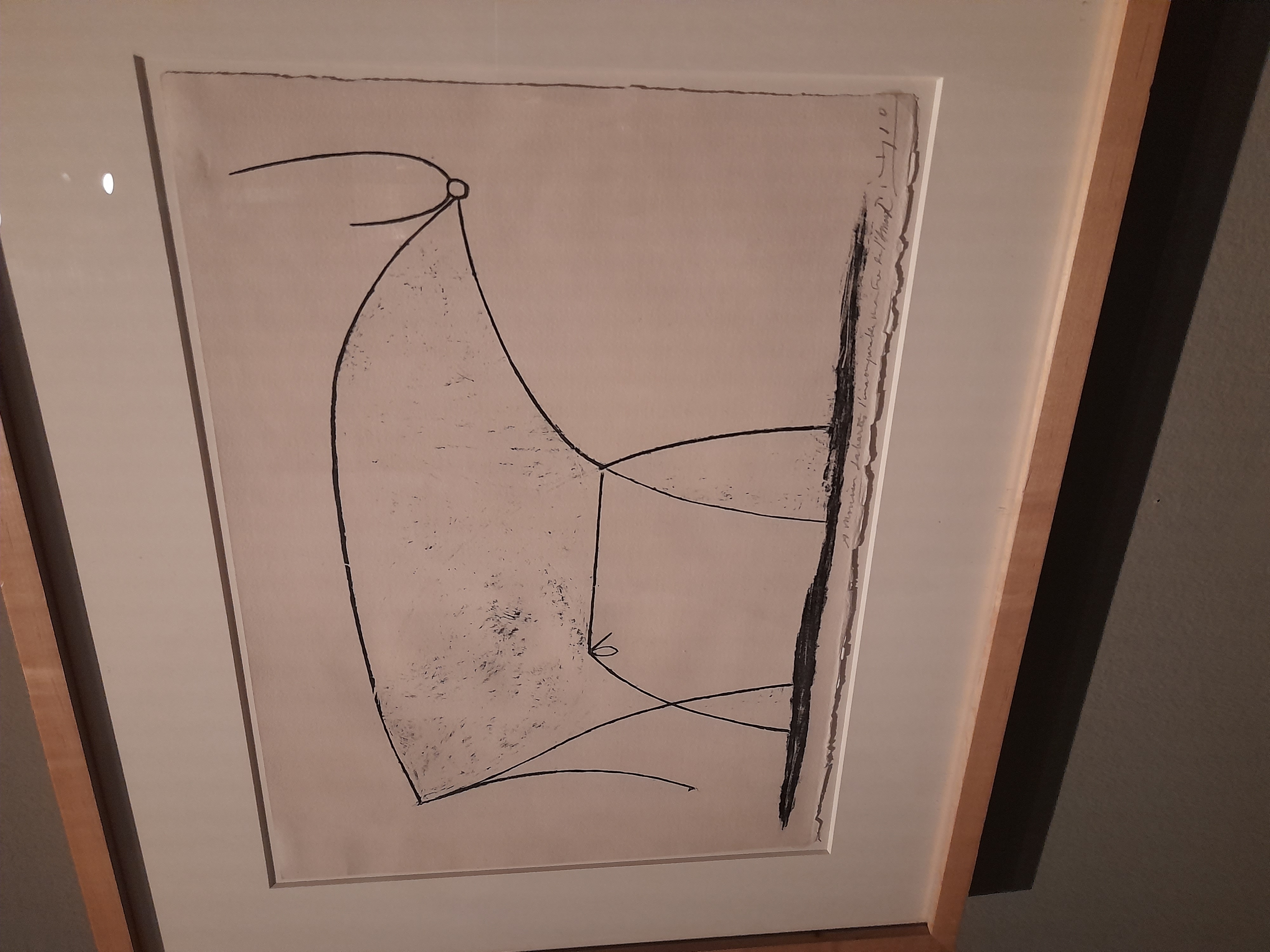

- Visited the Tapies foundation, saw a bunch of his paintings and a giant sock, and got stuck in the lift
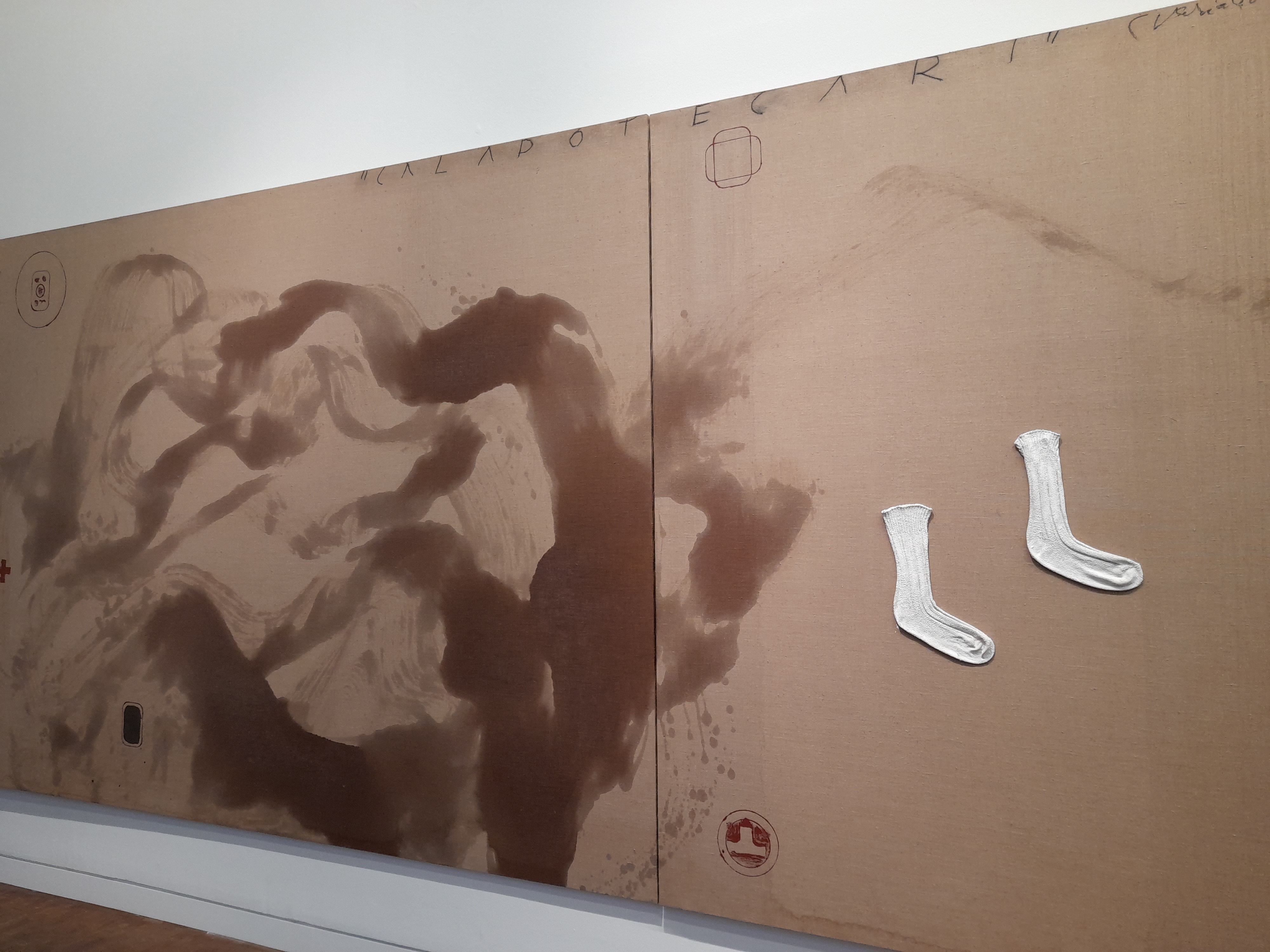
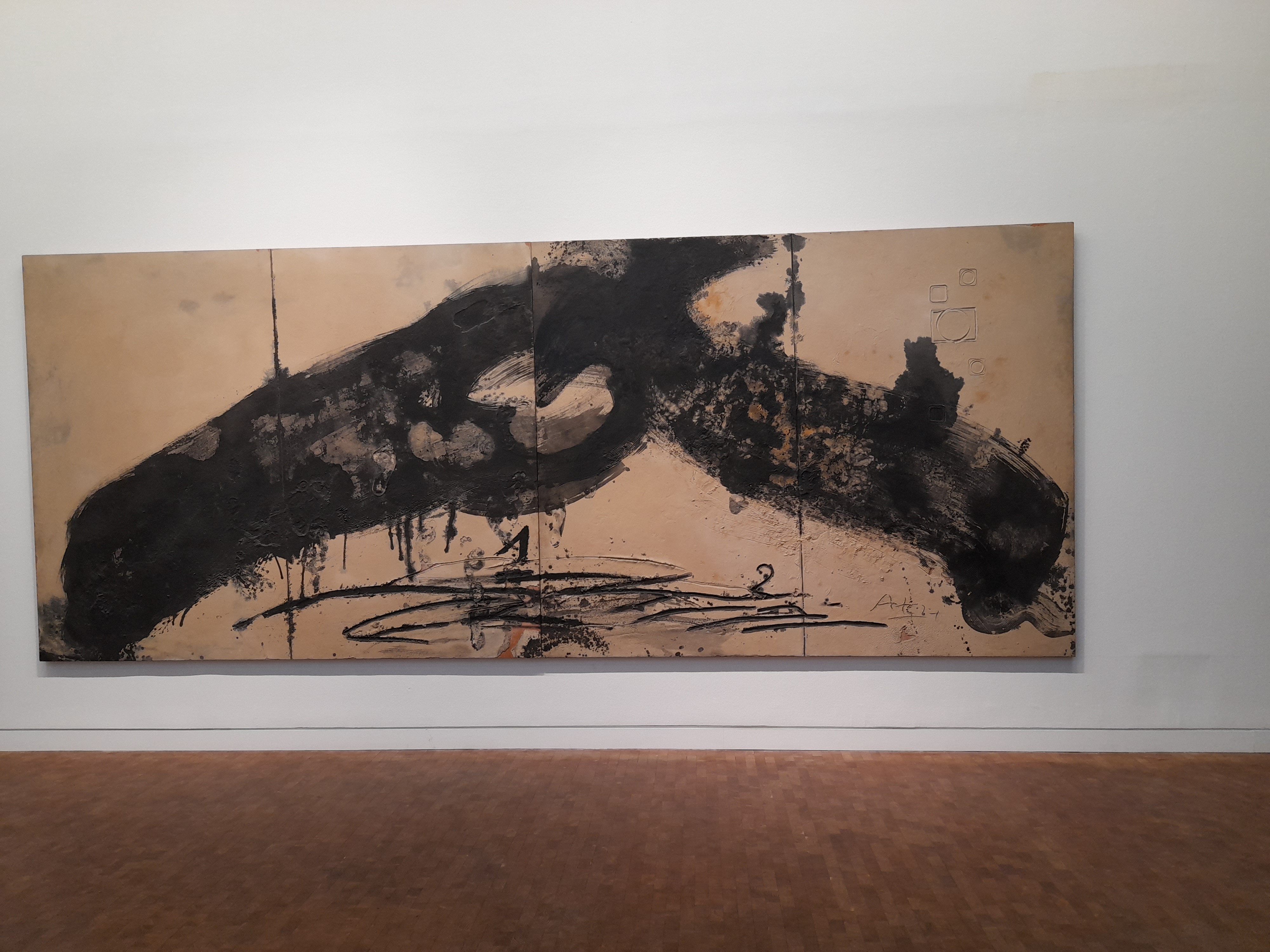
- Visited the Museu Maritim, which was by far my favourite place we went (and not just because they rescued my sketchbook after I accidentally left it there!) - they had an old Royal Galley in the museum as well as a 100 year old schooner at the dock outside that we got to explore on board, a bunch of old maps, globes, and atlasses, cutlasses, ship paintings, and even a lamp from a lighthouse! Great place to sit and draw!
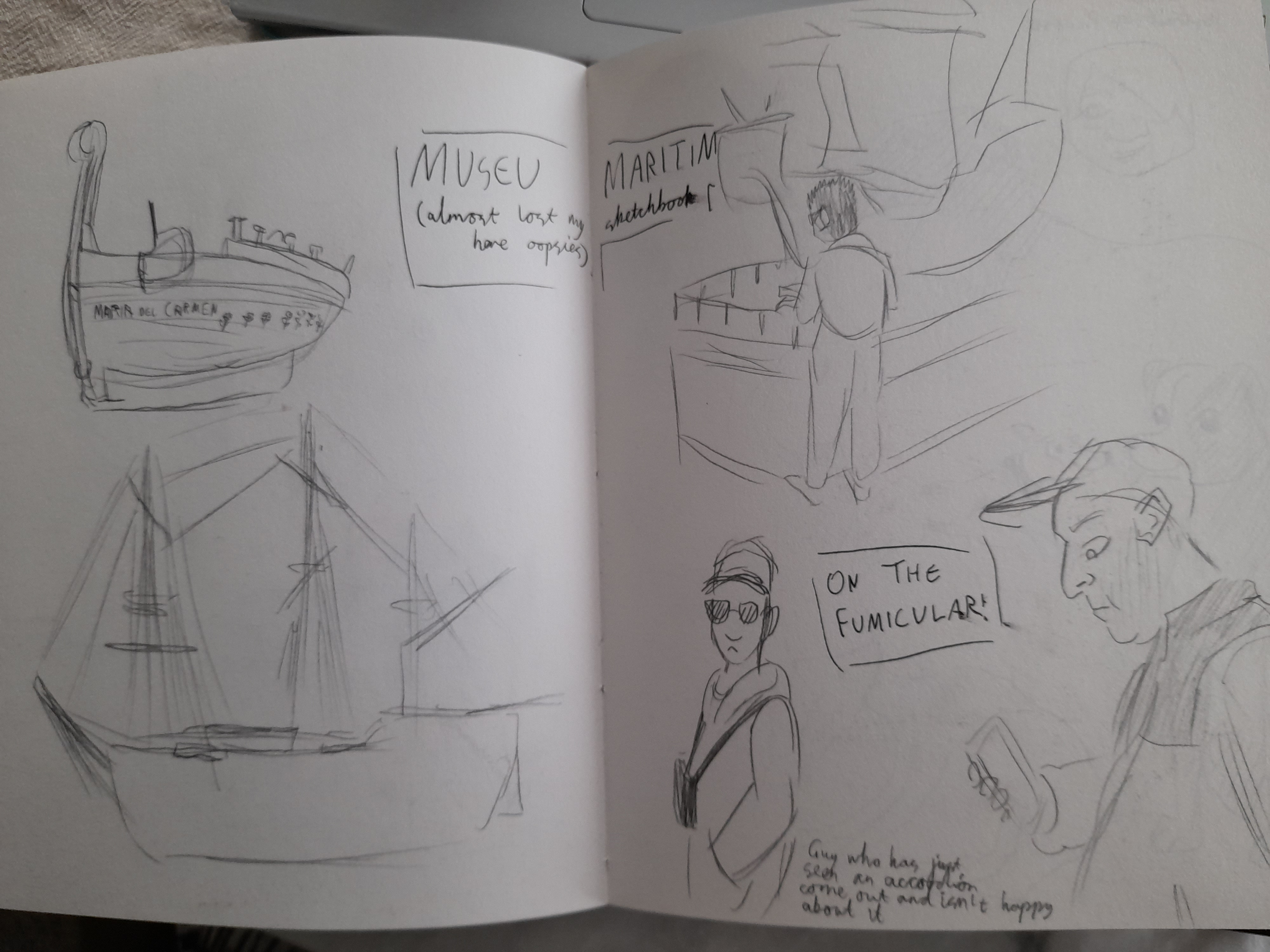



.jpg)


- Had a guided tour of the Sagrada Familia Basilica, which was absolutely gorgeous!



- Explored the modernism rooms at the MNAC (Museu Nacional d'Art de Catalunya) and spent so much time there we didn't have time to look at any of the older art. Ah well, the more modern stuff was probably more interesting - loved the impressionist landscapes and the surrealism rooms, especially since we found out on day one that the Dali museum was in fact several hours away by train, but at least we got to see some of his work at MNAC!
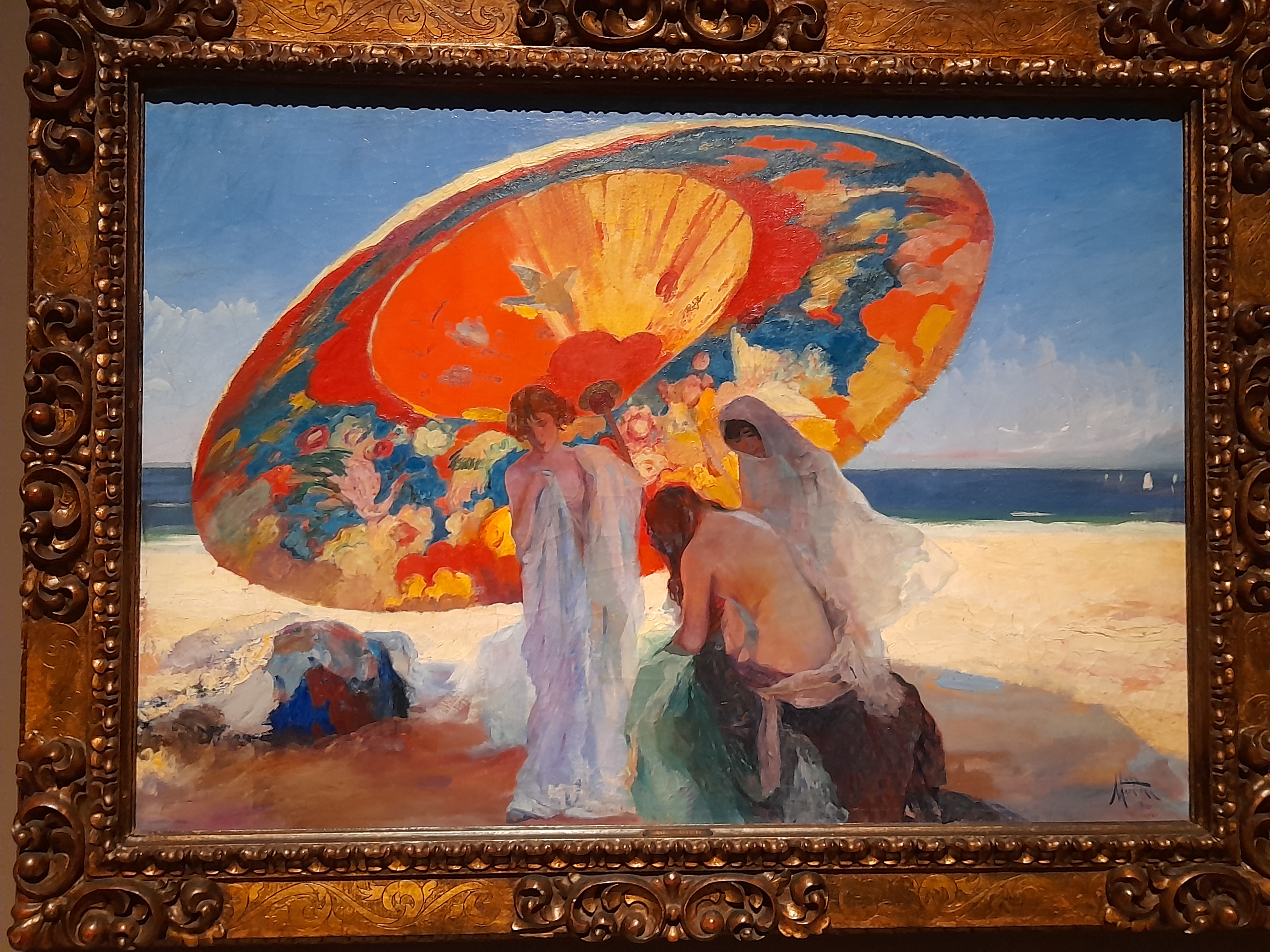





- Had a lovely walk through Park Montjuic to the Miro Foundation (and got some gorgeous views of the city on the way) which was actually pretty interesting from a gender perspective! Love Miro, but dear god I'm starting to think all these classic painters had issues with women or something. Like why do women always have to be archetypes and sexual figures? Miro stop talking about how a large female sex organ is like a goddess and the birth of humankind you're scaring the hoes.




- On the last day visited the Erotic Museum, which was pretty fun even if (at the risk of sounding like a raging SJW) I do wish it had been a bit more political. Like I just don't think you can claim to be accurately representing the history of sexuality and how sex is portrayed in art if you're not going to engage with the impact of racism and homophobia and only bring up sexism in a surface-level way. Like ok sure you can talk about how it's bad that a lot of women are repressed and not able to enjoy sex (but also like how much space does that kind of feminism leave for people like me? Fucking whatever it's not all about me) but why do you have a room dedicated to sex scandals that puts Woody Allen marrying his adopted daughter on the same level as someone having on an affair? Why are you so unwilling to talk about how a lot of women embroiled in these scandals (often in positions of less power) like Monica Lewinsky and Pamela Anderson had their lives ruined by the media? Why did the AIDS crisis barely get mentioned? And I don't want to make it sound like I didn't enjoy myself because I did - there was a lot of really interesting historical info, and it was great getting to see the Rubens nudes and the Klimt wall and the Russian erotic art (seriously the Russians were onto something when it came to this shit all the paintings and drawings in the Russian section were like. incredible) but yeah. Idk maybe I'm just in too deep at this point and a lot of it felt a bit surface level to me.


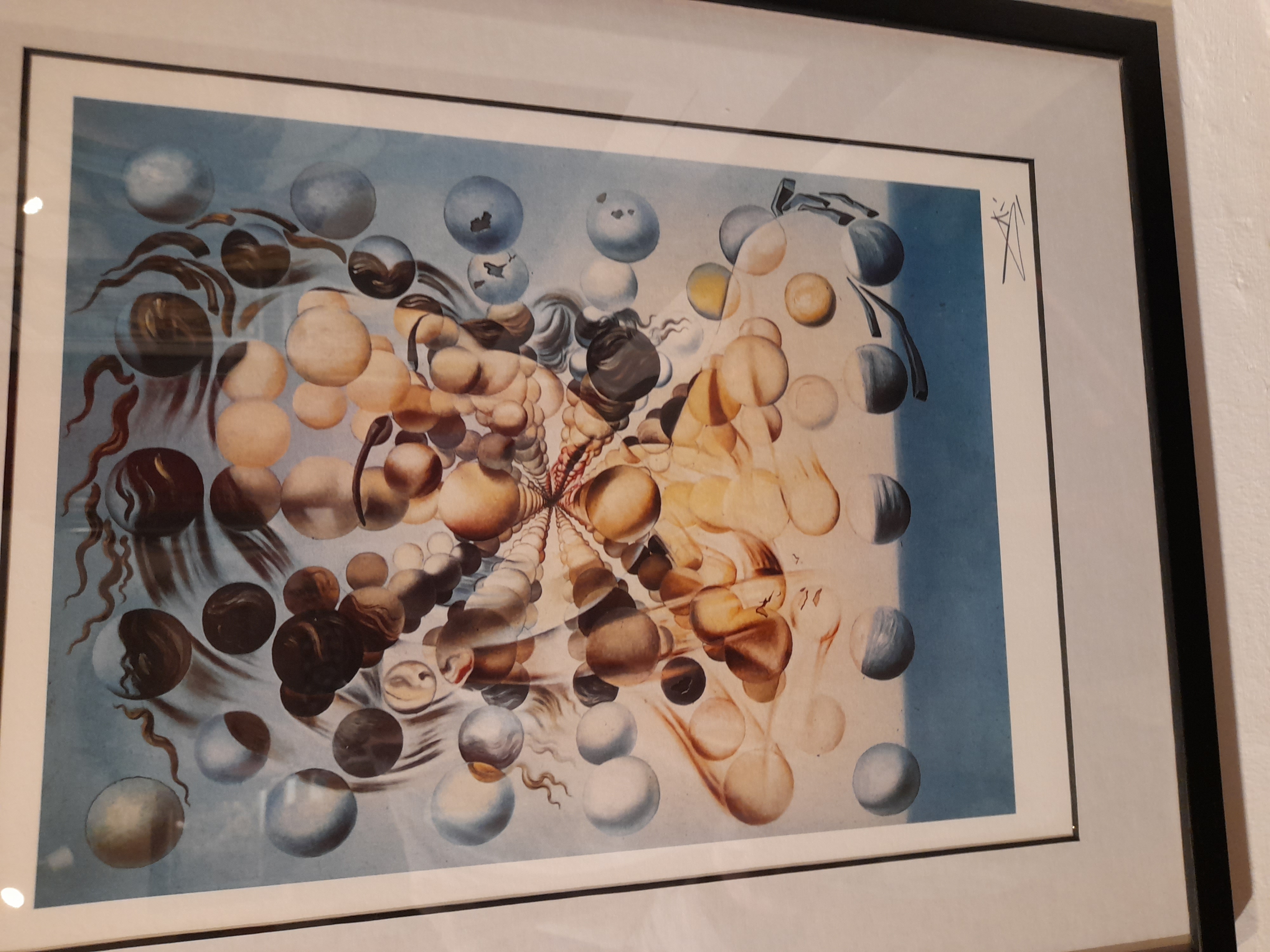


Overall a very interesting and fun trip!! I'll admit me and Miles were both insanely optimistic about how much MRes work we'd be able to get done on it though. "Oh we'll work in the evenings at the hotel after we get back from seeing the museums and galleries" we did no such thing I cannot lie.
Reading of the week
That said I did manage to finally finish The History of Sexuality! The Erotic Museum may not have lived up to my expectations but at least Michel will never let me down! One final round of Foucault notes let's go!
- "This is the essential thing: that Western man has been drawn for three centuries to the task of telling everything concerning his sex; that since the classical age there has been a constant optimization and an increasing valorization of the discourse on sex; and that this carefully analytical discourse was meant to yield multiple effects of displacement, intensification, reorientation, and modification of desire itself." (p.23)
- "The boundaries of what one could say about sex [were] enlarged, and men compelled to hear it said" (p.23)
- "A censorship of sex? There was installed rather an appartatus for producing an ever greater quantity of discourse about sex" - at this point Michel is kind of making the same point a billion times icl (p.23)
- "Toward the beginning of the eighteenth century, there emerged a political, economic, and technical incitement to talk about sex. And not so much in the form of a general theory of sexuality as in the form of (p.23) analysis, stocktaking, classification, and specification, of quantitative and causal studies" (p.24)
- Foucault argues that people wanted to create "a discourse on sex that would not derive from morality alone but from rationality as well" (p.24)
- Foucault's ongoing criticism of the medical establishment feels relevant considering how the medicalisation of asexuality is such a pressing issue - "The medical establishment, which one might have expected to be less surprised by what it was about to formulate, still stumbled at the moment of speaking" - medical establishment still unwilling to be frank about sex (p.24)
- "What is essential is not in all these scruples, in the 'moralism' they betray, or in the hypocrisy one can suspect them of, but in the recognized necessity of overcoming this hesitation" - so people were unwilling to talk about sex but still considered talking about sex important (p.24)
- "One had to speak of it [sex] as of a thing to be not simply condemned or tolerated but managed, inserted into systems of utility, regulated for the greater good of all, made to function according to an option" (p.24)
- Interesting historical context - "In the eighteenth century, sex became a 'police' matter" (p.24)
- So we ended up with "A policing of sex" and "the necessity of regulating sex through useful and public discourses" (p.25)
- "At the heart of this economic and political problem of population was sex: it was necessary to analyze the birthrate, the age of marriage, the legitimate and illegitimate births, the precocity and frequency of sexual relations, the ways of making them fertile or sterile, the effects of unmar- (p.25) ried life or of the prohibition, the impact of contraceptive practices" (p.26)
- Interesting point connecting to Brown's discussion of pronatalism - "This was the first time that a society had affirmed, in a constant way, that its future and its fortune were tied not only to the number and uprightness of its citizens, to their marriage rules and family organizations, but to the manner in which each individual made use of his sex. Things went from ritual lamenting over the unfruitful debauchery of the rich, bachelors, and libertines to a discourse in which the sexual conduct of the population was taken both as an object of analysis and as a target of intervention" - feels like a precursor to pronatalism (p.26)
- According to Foucault there were "much more subtle and calculated attempts at regulation that tended to favor or discourage - according to the objectives and exigencies of the moment - an increasing birthrate" - again very little has changed (p.26)
- "There emerged the analysis of the modes of sexual conduct, their determinations and their effects, at the boundary line of the biological and the economic domains" (p.26)
- These new discourses "tried to transform the sexual conduct of couples into a concerted economic and political behavior. In time these new measures would become anchorage points for the different varieties of the nineteenth and twentieth century" - so the eighteenth century wasn't when sex became repressed so much as politicised - sex always intertwined with racism and stuff like that (p.26)
- To sum up: "Sex became an issue, and a public issue no less" (p.26)
- Foucault lists several "centers which in the eighteenth or nineteenth century began to produce discourses on sex. First there was medicine, via the 'nervous disorders'; next psychiatry, when it set out to discover the etiology of mental illnesses [...] criminal justice, too, which had long been concerned with sexuality, particularly in the form of 'heinous' crimes [...] broadened its jurisdiction to include petty offenses, minor indecencies, insignificant perversions" (p.30)
- "It may well be that we talk about sex more than anything else; we set our minds to the task; we convince ourselves that we have never said enough on the subject" - WHICH I GUESS I'M ALSO DOING LOL. SORRY FOUCAULT. (p.33)
- "It is possible that where sex is concerned, the most long-winded, the most impatient of societies is our own" (p.33)
- "Rather than the uniform concern to hide sex, rather than a general prudishness of language, what distinguishes these last three centuries is the variety, the wide dispersion of devices that were invented for speaking about it" (p.34)
- "What is peculiar to modern societies, in fact, is not that they consigned sex to a shadow existence, but that they dedicated themselves to speaking of it ad infinitum, while exploiting it as the secret" - and then no one was ever normal about sex again (p.35)
- Foucault acknowledges "It would be a mistake to see in this proliferation of discourses merely a quantitative phenomenon, something like a pure increase, as if what was said in them were immaterial, as if the fact of speaking about sex were of itself more important than the forms of imperatives that were imposed on it by speaking about it" (p.36)
- "Through the various discourses, legal sanctions against minor perversions were multiplied; sexual irregularity was annexed to mental illness; from childhood to old age, a norm of sexual development was defined and all the possible deviations were carefully described" - so could be seen as still serving repression, also relevant to pathologisation today" (p.36)
- Arguably there is "one basic concern: to ensure popula- (p.36) tion, to reproduce labor capacity, to perpetuate the form of social relations: in short, to constitute a sexuality that is economically useful and politically conservative" - notably asexuality and aromanticism would not fit into this, Brown makes a point about this (p.37)
- "This much is certain: reduction has not been the means employed for trying to achieve it [the above objective]. The nineteenth centruy and our own have been rather the age of multiplication: a dispersion of sexualities, a strengthening of their disparate forms, a multiple implantation of 'perversions.' Our epoch has initiated sexual heterogeneities" (p.37)
- "Up to the end of the eighteenth century, three major explicit codes - apart from the customary regularities and constraints of opinion - goverened sexual practices: canonical law, the Christian pastoral, and civil law. They determined, each in its own way, the division between licit and illicit. They were all centered on matrimonial relations: the marital obligation, the ability to fulfill it, the manner in which one complied with it, the requirements and violences that accompanied it" - connects to compulsory sexuality (p.37)
- "The sex of husband and wife was beset by rules and recommendations [...] "It was under constant surveillance: if it was found to be lacking, it had to come forward and plead its case before a witness" (p.37)
- In the 18th-19th centuries, there were "two modifications": "First, a centrifugal movement with respect to heterosexual monogamy [...] It was spoken of less and less, or in any case with a growing mdoeration [...] The legitimate couple, with its regular sexuality, had a right to more discretion". The second: "What came under scrutiny was the sexuality of children, mad men and women, and criminals; the sensuality of those who did not like the opposite sex" (p.38)
- Two types of sexual 'offences' emerged: "There appeared on the one hand infractions against the legislation (or morality) pertaining to the marriage and the family, and on the other, offenses against the regularity of a natural function" (p.39)
- More medicalisation stuff!! There was "an incorporation of perversions and a new specification (p.42) of individuals" (p.43)
- "The nineteenth-century homosexual became a personage, a past, a case history, and a childhood, in addition to being a type of life, a life form, ,and a morphology, with an indiscreet anatomy and possibly a mysterious physiology" (p.43)
- "We must not forget that the psychological, psychiatric, medical category of homosexuality was constituted from the moment it was characterized - Westphal's famous article of 1870 on 'contrary sexual sensations' can stand as its date of birth - less by a type of sexual relations than by a certain quality of sexual sensibility, a certain way of inverting the masculine and the feminine in oneself. Homosexuality appeared as one of the forms of sexuality when it was transposed from the practice of sodomy onto a kind of interior androgyny, a hermaphroditism of the soul. The sodomite had been a temporary aberration; the homosexual was now a species" (p.43) - idea of alternate sexualities becoming concrete
- Mentions Krafft-Ebing as one of the "nineteenth-century psychiatrists" who "entomologized" "minor perverts" - sounds familiar, was probably mentioned in Chen or Brown I should double check (p.43)
- VERY RELEVANTLY TO ME, one of the new 'perversions' that were named in this time that Foucault brings up is "auto-monosexualists", defined by Rohleder (p.43) - I looked into this because the term was similar to a lot of early terminology for what we would now call asexuality, and there does appear to be some overlap? I found this site which discusses Hirschfeld's criticism of Rohleder, and apparently auto-monosexualism was defined as "the drive is directed toward themselves only and alone... that the individuals in question, themselves and certainly alone, and the point of departure and end goal of the sexual drive", which would fit with some definitions of asexuality! So origin story of asexuality being pathologised perhaps...
- Argues that the focus "on this whole alien strain did not aim to suppress it, but rather to give it an analytical, visible, and permanent reality" (p.44)
- Good phrase that I might steal: "the medicalization of the sexually peculiar" (p.44)
- "At issue, rather, is the type of power it brought to bear on the body and on sex. In point of fact, this power had neither the form of the law, nor the effects of the taboo. On the contrary, it acted by multiplication of singular sexualities. It did not set boundaries for sexuality; it extended the various forms of sexuality, pursuing them according to lines of indefinite penetration. It did not exclude sexuality, but included it in the body as a mode of specification of individuals. It did not seek to avoid it; it attracted its varieties by means of spirals in which pleasure and power reinforced one another. It did not set up a barrier, it provided places of maximum saturation. It produced and determined the sexual mosaic. Modern society is perverse, not in spite of its puritanism or as if from a backlash provoked by its hypocrisy; it is in actual fact, and directly, perverse" (p.47)
- "It is possible that the West has not been capable of inventing any new pleasures, and it has doubtless not discovered any original vices. But it has defined new rules for the game of powers and pleasures." (p.48)
- "We must therefore abandon the hypothesis that modern industrial societies ushered in an age of increased sexual repression" instead there was "the proliferation of specific pleasures and the multiplication of disparate sexualities" (p.49)
- More shit talking the medical establishment LOOOOOOL "This was in fact a science made up evasions since, given its inability or refusal to speak of sex itself, it concerned itself primarily with aberrations, perversions, exceptional oddities, pathological abatements, and morbid aggravations" (p.53)
- "Claiming to speak the truth, it stirred up people's fears; to the least oscillations of sexuality, it ascribed an imaginary dynasty of evils destined to be passed on for generations" (p.53)
- "Historically, there have been two great procedures for producing the truth of sex" - First is "the erotic art" that Foucault says we can see in "China, Japan, India, Rome, the Arabo-Moslem societies" where "truth is drawn from pleasure itself" (p.57) - Then there's Western society's "scientia sexualis" which is "geared to a form of knowledge-power strictly opposed to the art of initiations and the masterful secret" (p.58)
- Foucault argues that we're actually under more pressure to confess than repress when it comes to sex - "One has to be completely taken in by this internal ruse of confession in order to attribute a fundamental role to censorship, to taboos regarding speaking and thinking" (p.60)
- "From the Christian penance to the present day, sex was a privileged theme of confession" (p.61)
- "The confession was, and still remains, the general standard governing the production of true discourse on sex" (p.63)
- "But with the rise of Protestantism, the Counter Reformation, eighteenth-century pedagogy, and nineteenth-century medicine, it gradually lost its ritualistic and exclusive localization; it spread; it has been employed in a whole series of relationships: children and parents, students and educators, patients and psychiatrists, delinquents and experts" (p.63)
- "Western societies thus began to keep an indefinite record of these people's pleasures. They made up a herbal of them and established a system of classification. They described their everyday deficiencies as well as their oddities or exasperations" (p.64)
- "How did this immense and traditional extortion of the sexual confession come to be constituted in scientific terms?" (p.65)
- "There was scarcely a malady or physical disturbance to which the nineteenth century did not impute at least some degree of sexual etiology" (p.65)
- "The principle of sex as a 'cause of any and everything' was the theoretical underside of a confession that had to be thorough, meticulous, and constant" (p.65)
- More talk about medicalisation: "This implied furthermore that sex would derive its meaning and its necessity from medical interventions: it would be required by the doctor, necessary for diagnosis, and effective by nature in the cure" (p.67)
- Concludes that our society "has pursued the task of producing true discourses concerning sex" (p.67)
- "Nearly one hundred and fifty years have gone into the making of a complex machinery for producing true discourses on sex" - sex is kind of taboo but people are still obsessed with talking about it (p.68)
- "Not only did speak of sex and compel everyone to do so; it also set out to formulate the uniform truth of sex. As if it suspected sex of harboring a fundamental secret" (p.69)
- Foucault speaks of "an immense curiosity about sex" (p.77) which icl I'm starting to find quite funny. Sorry Foucault but I am actually doing the very thing you're criticising. Sorry. I'm not beating the 'obsessed with analysing sex' allegations
- Admits that "the assertion that sex is not 'repressed' is not altogether new" and that it has been promoted by psychoanalysts - "the idea of a rebellious energy that must be throttled has appeared to them inadequate for deciphering the manner in which power and desire are joined to one another" (p.81)
- "One should not think that desire is repressed, for the simple reason that the law is what constitutes both desire and the lack on which it is predicated" (p.81) - desire is constructed!! Fascinating shit!!!
- Another absolute banger line: "The representation of power has remained under the spell of monarchy. In political thought and analysis, we still (p.88) have not cut off the head of the king" (p.89)
- VERY important point: "Relations of power are not in a position of exteriority with respect to other types of relationships (economic processes, knowledge relationships, sexual relations), but are immanent in the latter" - power relationships exist within sexual relationships anyway (p.94)
- "There is no power that is exercised without a series of aims and objectives" (p.95)
- "Where there is power, there is resistance, and yet, or rather consequently, this resistance is never in a position of exteriority in relation to power" (p.95)
- Identifies the key questions of his study: "In a specific type of discourse on sex, in a specific form of extortion of truth, appearing historically and in specific places (around the child's body, apropos of women's sex, in connection with practices restricting births, and so on), what were the most immediate, the most local power relations at work? How did they make possible these kinds of discourses, and conversely, how were these discourses used to support power relations at work? How did they make possible these kinds of discourses, and conversely, how were these discourses used to support power relations? How was the action of these power relationsmodified by their very exercise, entailing a strengthening of some terms and a weakening of others, with effects of resistance and counterinvestments, so that there has never existed one type of stable subjugation, given once and for all? How were these power relations linked to one another according to the logic of a great strategy, which in retrospect takes on the aspect of a unitary and voluntarist politics of sex?" oh my GOD Foucault please please use fewer words (p.97)
- "We must immerse the expanding production of discourses on sex in the field of multiple and mobile power relations" (p.98)
- "If sexuality was constituted as an area of investigation, this was only because relations of power had established it as a possible object; and conversely, if power was able to take it as a target, this was because techniques of knowledge and procedures of discourse were capable of investing it. Between techniques of knowledge and strategies power, there is no exteriority" (p.98)
- "It is in discourse that power and knowledge are joined together" - connects to Chen's points about epistemic injustice (p.100)
- "Discourse transmits and produces power; it reinforces it, but also undermines and exposes it, renders it fragile and makes it possible to thwart it. In like manner, silence and secrecy are a shelter for power, anchoring its prohibitions; but they also loosen its holds and provide for relatively obscure areas of tolerance" - wow maybe I can do that.... (p.101)
- "There is no question that the appearance in nineteenth-century psychiatry, jurisprudence, and literature of a whole series of discourses on the species and subspecies of homosexuality, inversion, pederasty, and 'psychic hermaphroditism' made possible a strong advance of social controls into this area of 'perversity'; but it also made possible the formation of a 'reverse' discourse: homosexuality began to speak in its own behalf, to demand that its legitimacy or 'naturality' be acknowledged, often in the same vocabulary, using the same categories by which it was medically disqualified" - good example of Foucault's point about resistance (p.101)
- Sexuality "appears rather as an especially dense transfer point for relations of power: between men and women, young people and old people, parents and offspring, teachers and students, priests and laity, an administration and a population" (p.103)
- "There is no single, all-encompassing strategy, valid for all of society and uniformly bearing on all the manifestations of sex" - important!! (p.103)
- Foucault lists "four great strategic unities which, beginning in the eighteenth century, formed specific mechanisms of knowledge and power centering on sex" (p.103)
- First, "A hysterization of women's bodies" - "The feminine body was analyzed - qualified and disqualified - as being thoroughly saturated with sexuality; whereby it was integrated into the sphere of medical practices, by reason of a pathology intrinsic to it" - women seen as inherently sexual (p.104)
- Second, "A pedagogization of children's sex" - "A double assertion that practically all children indulge or are prone to indulge in sexual activity; and that, being unwarranted, at the same time 'natural' and 'contrary to nature,' this sexual activity posed physical and moral, individual and collective dangers" (p.104)
- Third, "A socialization of procreative behavior" - icl I have no idea what Foucault was on about with this one (p.104)
- Finally, "A psychiatrization of perverse pleasure" - "The sexual instinct was isolated as a separate biological and psychical instinct; a clinical analysis was made of all the forms of anomalies by which it could be afflicted" and "a corrective technology was sought for these anomalies" - this would be where pathologisation of low sexual desire comes in to play (p.105)
- "Sexuality must not be thought of as a kind of natural given which power tries to hold in check, or as an obscure domain which knowledge tries gradually to uncover. It is the name that can be given to a historical construct: not a furtive reality that is difficult to grasp, but a great surface network in which the stimulation of bodies, the intensification of pleasures, the incitement (p.105) to discourse, the formation of special knowledges, the strengthening of controls and resistances, are linked to one another, in accordance with a few major strategies of knowledge and power" (p.106)
- "New personages made their appearance: the nervous woman, the frigid wife, the indifferent mother [...] the impotent, sadistic, perverse husband, the hysterical or neurasthenic girl, the precocious and already exhausted child, and the young homosexual who rejects marriage or neglects his wife" (p.110) frigidity mention raaaaaahhh
- Discusses two phases of attitudes to sexuality: "The first phase corresponded to the need to form a 'labor force' (hence to avoid any useless 'expenditure', any wasted energy, so that all forces were reduced to labor capacity alone) and to ensure its reproduction (conjugality, the regulated fabrication of children). The second phase corresponded to that epoch of Spätkapitalismus in which the exploitation of wage labor does not demand the same violent and physical constraints as in the nineteenth century, and where the politics of the body does not require the elision of sex or its restriction solely to the reproductive function; it relies instead on a multiple channeling into the controlled circuits of the economy - on what has been called a hyper-repressive desublimation" (p.114)
- "Through pedagogy, medicine, and economics, it made sex not only a secular concern but a concern of the state as well [...] sex became a matter that required the social body as a whole, and virtually all of its individuals, to place themselves under surveillance" (p.116)
- "Medicine, whose objective was the sexual physiology peculiar to women" - interesting point about medicalisation of sexuality (p.116)
- Mentions Pyschopathia Sexualis (p.118), which I'm pretty sure either Chen or Brown also mention - check that!
- "In the same period, the analysis of heredity was placing sex (sexual relations, venereal diseases, matrimonial alliances, perversions) in a position of 'biological responsibility' with regard to the species: not only could sex be affected by its own diseases, it could also, if it was not controlled, transmit diseases or create others that would afflict future generations" (p.118)
- "It is worth remembering that the first figure to be invested by the deployment of sexuality, one of the first to be 'sexualized' was the 'idle' woman" AKA upper class/bourgeois women (p.121)
- Foucault once again argues "it appears unlikely that there was an age of sexual restriction" (p.122)
- "With this investment of its own sex by a technology of power and knowledge which it had itself invented, the bourgeoisie underscored the high political price of its body, sensations, and pleasures, its well-being and survival" (p.123)
- "The bourgeoisie made this element identical with its body, or at least subordinated the latter to the former by attributing to it a mysterious and undefined power; it staked its life and its death on sex by making it responsible for its future welfare; it placed its hopes for the future in sex by imagining it to have ineluctable effects on generations to come; it subordinated its soul to sex by conceiving of it as what constituted the soul's most secret and determinant part" (p.124)
- Another v important point: "The works, published in great numbers at the end of the eighteenth century, on body hygiene, the art of longevity, ways of having healthy children and of keeping them alive as long as possible, and methods for improving the human lineage, bear witness to the fact: they thus attest to the correlation of this concern with the body and sex to a type of 'racism'" - it's kinda eugenics-y. basically. (p.125)
- "One understands why it took such a long time and was so unwilling to ackowledge that other classes had a body and a sex" (p.126)
- "We must say that there is a bourgeois sexuality, and that there are class sexualities" (p.127)
- "This whole sexual 'revolution', this whole 'antirepressive' struggle, represented nothing more, but nothing less - and its importance is undeniable - than a tactical shift and reversal in the great deployment of sexuality" (p.131)
- "It was at the pivot of the two axes along which developed the entire political technology of life. On the one hand it was tired to the disciplines of the body: the harnessing, intensification, and distribution of forces, the adjustment and economy of energies. On the other hand, it was applied to the regulation of populations, through all the far-reaching effects of its activity" (p.145)
- "In the nineteenth century sexuality was sought out in the smallest details of individual existences; it was tracked down in behavior, pursued in dreams; it was suspected of underlying the least follies, it was traced back into the earliest years of childhood; it became the stamp of individuality" (p.146)
- Another great gender point: "The hysterization of women, which involved a thorough medicalization of their bodies and their sex, was carried out in the name of the (p.146) responsibility they owed to the health of their children, the solidity of the family institution, and the safeguarding of society" (p.147)
- "Broadly speaking, at the juncture of the 'body' and the 'population,' sex became a crucial target of a power organized around the management of life rather than the menace of death" (p.147)
- "Through the themes of health, progeny, race, the future of the species, the vitality of the social body, power spoke of sexuality and to sexuality" (p.147)
- One point I thought was a bit odd: "It is an irony of history that the Hitlerite politics of sex remained an insignificant practice while the blood myth was transformed into the greatest blood bath in recent memory" - like I get what Foucault meant but also IIRC from my GCSEs I'm pretty sure the Nazis were like. pretty obsessed with getting the birthrate up. Like maybe I'm misunderstanding but that it feels odd to say that was "insignificant" (p.150)
- "Is 'sex' really the anchorage point that supports the manifestations of sexuality, or is it not rather a complex idea that was formed inside the deployment of sexuality?" so sexuality is not based on sex but the other way around (p.152)
- "All along the great lines which the development of the deployment of sexuality has followed since the nineteenth century, one sees the elaboration of this idea that there exists something other than bodies, organs, somatic localizations, functions, anatomo-physiological systems, sensations, and (p.152) pleasures; something else and something more, with intrinsic properties and laws of its own: 'sex'" (p.153)
- Explains that sex was "defined in three ways: as that which belongs in common to men and women; as that which belongs, par excellence, to men, and hence is lacking in women; but at the same time, as that which by itself contributes woman's body, ordering it wholly in terms of the functions of reproduction" (p.153)
- "It was one of the tenets of eighteenth- and nineteenth-century medicine that precocious sex would eventually result in sterility, impotence, frigidity, the inability to experience pleasure, or the deadening of the senses" (p.153)
- "Sex was thus able to function as a unique signifier and as a universal signified" (p.154)
- "We must not make the mistake of thinking that sex is an autonomous agency which secondarily produces manifold effects of sexuality over the entire length of its surface of contact with power. On the contrary, sex is the most speculative, most ideal, and most internal element in a deployment of sexuality organized by power in its grip on bodies and their materiality, their forces, energies, sensations, and pleasures" (p.155)
- "It is through sex - in fact, an imaginary point determined by the deployment of sexuality - that each individual has to pass in order to have access to his own intelligibility (seeing that it is both the hidden aspect and the generative principle of meaning), to the whole of his body (p.155) (since it is a real and threatened part of it, while symbolically constituting the whole), to his identity (since it joins the force of a drive to the singularity of a history)" - sex seen as a rite of passage! (p.156)
- "We have arrived at the point where we expect our intelligibility to come from what was for many centuries thought of as madness" (p.156)
- "Hence the importance we ascribe to it, the reverential fear with which we surround it, the care we take to know it" (p.156)
- "The Faustian pact, whose temptation has been instilled in us by the deployment of sexuality, is now as follows: to exchange life in its entirety for sex itself, for the truth and the sovereignty of sex. Sex is worth dying for. It is in this (strictly historical) sense that sex is indeed imbued with the death instinct. When a long while ago the West discovered love, it bestowed on it a value high enough to make death acceptable; nowadays it is sex that claims this equivalence, the highest of all. And while the deployment of sexuality permits the techniques of power to invest life, the fictitious point of sex, itself marked by that deployment, exerts enough charm on everyone for them to accept hearing the grumble of death within it" (p.156)
- Calls sex an "imaginary element" and says that discourse "constituted 'sex' itself as something desirable" (p.156)
- "It is this desirability that makes us think we are affirming the rights of our sex against all power, when in fact we are fastened to the deployment of sexuality that has lifted up from deep within a sort of mirage in which we think we see ourselves reflected - the dark shimmer of sex" - possible critique of sex positivity movement? (p.157)
- "'Sex' is historically subordinate to sexuality. We must not place sex on the side of reality, sexuality on that of confused ideas and illusions; sexuality is a very real historical formation; it is what gave rise to the notion of sex, as a speculative element necessary to its operation. We must not think that by saying yes to sex, one says no to power; on the contrary, one tracks along the course laid out by the general deployment of sexuality. It is agency of sex that we must break away from, if we aim - through a tactical reversal of the various mechanisms of sexuality - to counter the grips of power with the claims of bodies, pleasures, and knowledges, in their multiplicity and their possibility of resistance. The rallying point for the counterattack against the deployment of sexuality ought not to be sex-desire, but bodies and pleasures" (p.157)
- "We are often reminded of the countless procedures which Christianity once employed to make us detest the body; but let us ponder all the ruses that were employed for centuries to make us love sex, to make the knowledge of it desirable and everything said about it precious" GOD MICHEL U R SPEAKING MY LANGUAGE (p.159)
- "Moreover, we need to consider the possibility that one day, perhaps, in a different economy of bodies and pleasures, people will no longer quite understand how the ruses of sexuality, and the power that sustains its organization, were able to subject us to that austere monarchy of sex, so that we became dedicated to the endless task of forcing its secret, of exacting the truest of confessions from a shadow" - nice note to end on! (p.159)
Possible further reading:
- The Negative Sex - JP recommended this (apparently it's a "mess") but I can't find it anywhere LOL will need to look at this further
Previous week
Next week
Back to weekly journal
Back to home


















.jpg)






































.jpg)



















